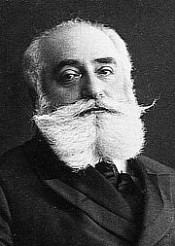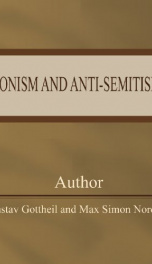Gottheil Gustav

Max Simon Nordau (July 29, 1849 - January 23, 1923), born Simon Maximilian Südfeld in Pest, Hungary, was a Zionist leader, physician, author, and social critic. He was a co-founder of the World Zionist Organization together with Theodor Herzl, and president or vice president of several Zionist congresses. As a social critic, he wrote a number of controversial books, including The Conventional Lies of Our Civilisation (1883), Degeneration (1892), and Paradoxes (1896). Although not his most popular or successful work whilst alive, the book most often remembered and cited today is Degeneration. Nordau was born Simon Maximilian, or Simcha Südfeld on 29 July 1849 in Budapest, then part of the Austrian Empire. His father was Gabriel Südfeld, a Hebrew poet. His family were religious Orthodox Jews and he attended a Jewish elementary school, then a Catholic grammar school, before achieving a medical degree. He worked as a journalist for small newspapers in Budapest, before heading to Berlin in 1873, and changing his name. He soon moved to Paris as a correspondent for Die Neue Freie Presse and it was in Paris that he spent most of his life. Nordau was an example of a fully assimilated and acculturated European Jew. He was married to a Protestant Christian woman, despite his Hungarian background, he felt affiliated to German culture, writing in an autobiographical sketch, "When I reached the age of fifteen, I left the Jewish way of life and the study of the Torah... Judaism remained a mere memory and since then I have always felt as a German and as a German only." Nordau's conversion to Zionism was eventually triggered by the Dreyfus Affair. Many Jews, amongst them Theodor Herzl saw in the Dreyfus Affair evidence of the universality of Anti-Semitism. Nordau went on to play a major role in the World Zionist Organisation, indeed Nordau's relative fame certainly helped bring attention to the Zionist movement. He can be credited with giving the organisation a democratic character. Nordau's major work Entartung (Degeneration), is a moralistic attack on so-called degenerate art, as well as a polemic against the effects of a range of the rising social phenomena of the period, such as rapid urbanization and its perceived effects on the human body. Nordau's conversion to Zionism is in many ways typical of the rise of Zionism amongst Western European Jewry. The Dreyfus Affair beginning in 1893 was central to Nordau's conviction that Zionism was now necessary. Herzl's views were formed during his time in France where he recognised the universality of anti-Semitism; the Dreyfus Affair cemented his belief in the failure of assimilation. Nordau also witnessed the Paris mob outside the École Militaire crying "à morts les juifs!" His role of friend and advisor to Herzl, who was working as the correspondent for the Vienna Neue Freie Presse, began here in Paris. This trial went beyond a miscarriage of justice and in Herzl's words "contained the wish of the overwhelming majority in France, to damn a Jew, and in this one Jew, all Jews." Whether or not the anti-semitism manifested in France during the Dreyfus Affair was indicative of the majority of the French or simply a very vocal minority is open to debate. However the very fact that such sentiment had manifested itself in France was particularly significant. This was the country often seen as the model of the modern enlightened age, that had given the Europe the Great Revolution and consequently the Jewish Emancipation. Nordau's work as a critic of European civilisation and where it was heading certainly contributed to his eventual role in Zionism. One of the central tenets of Nordau's beliefs was evolution, in all things, and he concluded that Emancipation was not born out of evolution. French rationalism of the 18th century, based on pure logic, demanded that all men be treated equally. Nordau saw in Jewish Emancipation the result of 'a regular equation: Every man is born with certain rights; the Jews are human beings, consequently the Jews are born to own the rights of man.' This Emancipation was written in the statute books of Europe, but contrasted with popular social consciousness. It was this which explained the apparent contradiction of equality before the law, but the existence of anti-Semitism, and in particular 'racial' anti-Semitism, no longer based on old religious bigotry. Nordau cited England as an exception to this continental anti-Semitism that proved the rule. "In England, Emancipation is a truth…It had already been completed in the heart before legislation expressly confirmed it." Only if Emancipation came from changes within society, as opposed to abstract ideas imposed upon society, could it be a reality. This rejection of the accepted idea of Emancipation was not based entirely on the Dreyfus Affair. It had manifested itself much earlier in Die Konventionellen Lügen der Kulturmenschheit and runs through his denouncing of 'degenerate' and 'lunatic' anti-Semitism in Die Entartung. Nordau was central to the Zionist Congresses which played such a vital part in shaping what Zionism would become. Herzl had favoured the idea of a Jewish newspaper and an elitist "Society of Jews" to spread the ideas of Zionism. It was Nordau, convinced that Zionism had to at least appear democratic, despite the impossibility of representing all Jewish groups, who persuaded Herzl of the need for an assembly. This appearance of democracy certainly helped counter accusations that the "Zionists represented no one but themselves." There would be eleven such Congresses in all, the first, which Nordau organised, was in Basle, 29-31 August 1897. His fame as an intellectual helped draw attention to the project. Indeed the fact that Max Nordau, the trenchant essayist and journalist, was a Jew came as a revelation for many. Herzl obviously took centre stage, making the first speech at the Congress; Nordau followed him with an assessment of the Jewish condition in Europe. Nordau used statistics to paint a portrait of the dire straits of Eastern Jewry and also expressed his belief in the destiny of Jewish people as a democratic nation state, free of what he saw as the constraints of Emancipation. Nordau's speeches to the World Zionist Congress reexamined the Jewish people, in particular stereotypes of the Jews. He fought against the tradition of seeing the Jews as merchants or business people, arguing that most modern financial innovations such as insurance had been invented by gentiles. He saw the Jewish people as having a unique gift for politics, a calling which they were unable to fulfil without their own nation-state. Whereas Herzl favoured the idea of an elite forming policy, Nordau insisted the Congress have a democratic nature of some sort, calling for votes on key topics. Nordau was also a staunch eugenicist. [1] (in Future Human Evolution - page 85) As the 20th Century progressed, Nordau seemed increasingly irrelevant as a cultural critic. The rise of Modernism, the popularity of very different thinkers such as Friedrich Nietzsche, the huge technological changes and the devastation of the First World War, changed European society enormously. Even within the Zionist movement, other strains of thought were growing in popularity - influenced by Nietzsche, Socialism and other ideas. Nordau, in comparison, seemed very much a creature of the late 19th Century. Nordau died in Paris, France in 1923. In 1926 his remains were moved to Tel Aviv.
do you like this author?
What readers are saying
What do you think? Write your own comment on this book!
write a commentWhat readers are saying
What do you think? Write your own comment on this author!
write a commentBook list

Zionism and Anti-Semitism
Series:
Unknown
Year:
Unknown
Raiting:
2.5/5
A first-rate account of the matter of anti-semitism that existed in 1902 and earlier. By Max Simon Nordau, a Zionist leader, and Gustav Gottheil, a Prussian born American rabbi of the 19th century.
Show more
add to favoritesadd In favorites
Book list

Zionism and Anti-Semitism
Series:
Unknown
Year:
Unknown
Raiting:
2.5/5
A first-rate account of the matter of anti-semitism that existed in 1902 and earlier. By Max Simon Nordau, a Zionist leader, and Gustav Gottheil, a Prussian born American rabbi of the 19th century.
Show more
add to favoritesadd In favorites
What readers are saying
What do you think? Write your own comment on this author!
write a commentif you like Gottheil Gustav try:
readers also enjoyed
What readers are saying
What do you think? Write your own comment on this author!
write a commentif you like Gottheil Gustav try:
readers also enjoyed
Do you want to read a book that interests you? It’s EASY!
Create an account and send a request for reading to other users on the Webpage of the book!

